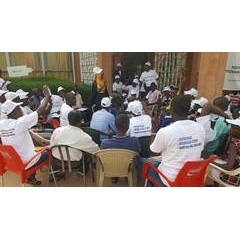
GCED Basic Search Form
Quick Search
You are here
News

From 3 to 8 July 2017, within the framework of the UNESCO Participation Programme, the Gambian National Commission for UNESCO, in partnership with UNESCO and UNFPA, gathered more than 200 young people from all regions of the country and their teachers, for a weeklong training at the Independence Stadium, Bakau, The Gambia. Students and their teachers learned how to promote fundamental values of peaceful co-existence, and better understand the concepts of Global Citizenship, Sustainable Development and Peacebuilding. At the end of the event, the participants adopted a Declaration calling youth organizations and national authorities for actions in favour of the integration of Global Citizenship Education and Education for Sustainable Education into the education system, the development of education and entrepreneurship programmes and the participation of community-based youth organization to decision-making processes.
After 22 years of autocratic rule and with 58% of the population under 25 years of age in the Gambia, young women and men are major agents of political change. “Young people are engine of growth, as they constitute the labour force of the Gambia. The peace and development of this country is in the hands of young people” emphasized Mr. Kunle Adeniji, head of the UNFPA Gambia Office. They have a very important role to play to ensure sustainable and peaceful development in the country. “Today, more than ever, it is important to raise awareness on the role that Gambian youth can play to support the implementation of Sustainable Development Goals (SDG). Their active participation is fundamental to the achievement of a peaceful and sustainable development and a proper management of issues related to education and skills, illegal migration, rise in crime rates, and climate change”, explained Hadjan Doucouré, Coordination officer of the Banjul Liaison Desk of the UNESCO Dakar Office.
This 6-days workshop aimed at empowering the Gambian youth from ASPNet, UNESCO Clubs Networks and Youth Organizations by providing them with the necessary life skills, and introducing them to the concepts of Global Citizenship and Sustainable development.
During the first 3 days, participants were introduced to SDG 16 which promotes peaceful and inclusive societies for sustainable development, and SDG 4 which calls on countries to ensure that all learners are provided with the knowledge and skills to promote sustainable development. SDG Target 4.7 particularly stipulates: “By 2030, ensure that all learners acquire the knowledge and skills needed to promote sustainable development, including, among others, through education for sustainable development and sustainable lifestyles, human rights, gender equality, promotion of a culture of peace and non-violence, global citizenship and appreciation of cultural diversity and of culture’s contribution to sustainable development.
To encourage the participants to engage their communities, families and friends through innovative way and contribute to socio-economic transformation of their communities, the organizers devoted 2 days of training to the development of entrepreneurial skills and creative thinking.
The 6-day event concluded with one-day sports competition supported by the Youth Empowerment though Education and Sports Foundation
